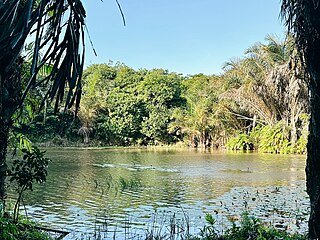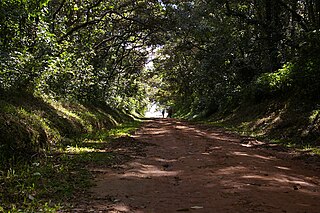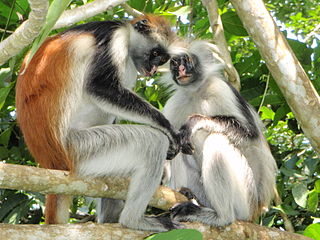
Forestry is the science and craft of creating, managing, planting, using, conserving and repairing forests and woodlands for associated resources for human and environmental benefits. Forestry is practiced in plantations and natural stands. The science of forestry has elements that belong to the biological, physical, social, political and managerial sciences. Forest management plays an essential role in the creation and modification of habitats and affects ecosystem services provisioning.

Permaculture is an approach to land management and settlement design that adopts arrangements observed in flourishing natural ecosystems. It includes a set of design principles derived using whole-systems thinking. It applies these principles in fields such as regenerative agriculture, town planning, rewilding, and community resilience. The term was coined in 1978 by Bill Mollison and David Holmgren, who formulated the concept in opposition to modern industrialized methods, instead adopting a more traditional or "natural" approach to agriculture.

Forest gardening is a low-maintenance, sustainable, plant-based food production and agroforestry system based on woodland ecosystems, incorporating fruit and nut trees, shrubs, herbs, vines and perennial vegetables which have yields directly useful to humans. Making use of companion planting, these can be intermixed to grow in a succession of layers to build a woodland habitat. Forest gardening is a prehistoric method of securing food in tropical areas. In the 1980s, Robert Hart coined the term "forest gardening" after adapting the principles and applying them to temperate climates.

Pemba Island is a Tanzanian island forming part of the Zanzibar Archipelago, lying within the Swahili Coast in the Indian Ocean.

Sackville is a former town in southeastern New Brunswick, Canada. It held town status prior to 2023 and is now part of the town of Tantramar.

Urban forestry is the care and management of single trees and tree populations in urban settings for the purpose of improving the urban environment. Urban forestry involves both planning and management, including the programming of care and maintenance operations of the urban forest. Urban forestry advocates the role of trees as a critical part of the urban infrastructure. Urban foresters plant and maintain trees, support appropriate tree and forest preservation, conduct research and promote the many benefits trees provide. Urban forestry is practiced by municipal and commercial arborists, municipal and utility foresters, environmental policymakers, city planners, consultants, educators, researchers and community activists.

Clearcutting, clearfelling or clearcut logging is a forestry/logging practice in which most or all trees in an area are uniformly cut down. Along with shelterwood and seed tree harvests, it is used by foresters to create certain types of forest ecosystems and to promote select species that require an abundance of sunlight or grow in large, even-age stands. Logging companies and forest-worker unions in some countries support the practice for scientific, safety and economic reasons, while detractors consider it a form of deforestation that destroys natural habitats and contributes to climate change. Environmentalists, traditional owners, local residents and others have regularly campaigned against clearcutting, including through the use of blockades and nonviolent direct action.

CERES Community Environment Park is a 4.5-hectare (11-acre) not-for-profit environmental education centre and social enterprise hub located in urban Brunswick East, Victoria, Australia.

Mkuranga District Council is one of eight administrative districts of Pwani Region in Tanzania. The District covers an area of 2,827 km2 (1,092 sq mi). It is bordered to the north by Dar es Salaam's Kigamboni, Temeke and Ilala Districts. To the east by the Mafia Channel, to the south by Kibiti District, and to the west by Kisarawe District. The district is comparable in size to the land area of Samoa. The town of Mkuranga serves as its administrative capital. The district is home to the Vikindu Forest Reserve, one of last remaining East African coastal forests. In 2016 the Tanzania National Bureau of Statistics report the population of Mkuranga District were 243,062 people in the district, from 222,921 in 2012.

Michaux State Forest is a Pennsylvania State Forest in Pennsylvania Bureau of Forestry District #1. The main offices are located in Fayetteville in Franklin County, Pennsylvania, USA.

CBAM-FM is a radio station broadcasting at 106.1 MHz from Moncton, New Brunswick, Canada, and is the local Radio One station of the Canadian Broadcasting Corporation. CBAM broadcasts with a power of 69,500 watts.
American Forests is a 501(c)(3) non-profit conservation organization, established in 1875, and dedicated to protecting and restoring healthy forest ecosystems. The current headquarters are in Washington, D.C.

CHMA-FM is a radio station broadcasting at 106.9 MHz in Sackville, New Brunswick, Canada. It is a campus/community station functioning as the campus radio station of Mount Allison University and the community radio station of Sackville, New Brunswick.

The Sustainable Forestry Initiative (SFI) is a sustainability organization operating in the U.S. and Canada that works across four pillars: standards, conservation, community, and education. SFI was founded in 1994 by the American Forest & Paper Association (AF&PA). SFI is the world's largest single forest certification standard by area. SFI is headquartered in Ottawa and Washington, D.C.

The Pemba flying fox is a species of flying fox in the family Pteropodidae. It is endemic to the island of Pemba on the coast of Tanzania.

Kenya's forests are fragmented across the country. Combined, forests cover over 37 million hectares. Out of those 37 million hectares, 2.1 million are woodlands, 24.8 million are bush lands and 10.7 are wooded grasslands. Kenya's forests are important at a global level as they host 1847 species of amphibians, birds, mammals, and reptiles of which 4% are only found in Kenya. Beyond its fauna, Kenya's forest also hosts 6505 types of vascular plants, with 4.1% only being found in Kenya. Today Kenya faces high rates of deforestation which endanger both its fauna and flora. It has been estimated that since Kenya's independence in 1963, the forest cover has dropped from 10% of the nation to 6%, losing approximately 12,000 hectares annually. These levels of deforestation have impacted Kenya as they rely on the forest for the storage of rainwater, the prevention of flooding, the fertility of the soil, and the regulation of climate conditions. The World War II period and its aftermath made it clear to British colonial administration that reform was needed to sustain Kenyan forests. One of the first steps for conservation took place with the 1941 revision of the Forest Ordinance that passed legislation to create forest reserves and create a committee with professionals on matters of conservation. By 1950, the forest department had gained control of 100,000 acres, but it had a difficult time sustaining the conservation of these areas; it required meaningful policy to meet the constant attention these areas needed.

The wildlife of Zanzibar consists of terrestrial and marine flora and fauna in the archipelago of Zanzibar, an autonomous region of Tanzania. Its floral vegetation is categorized among the coastal forests of eastern Africa as the Southern Zanzibar-Inhambane coastal forest mosaic and the Northern Zanzibar-Inhambane coastal forest mosaic. Its faunal species are mostly small animals, birds, and butterflies.

Deforestation in the Democratic Republic of the Congo (DRC) is an environmental conflict of international importance. Most of the deforestation takes place in the Congo Basin, which holds the second largest rainforest of the world after the Amazon. Roughly fifty percent of the remaining rainforest in the Congo Basin lies within the boundaries of the DRC.

A community orchard is a collection of fruit trees shared by communities and growing in publicly accessible areas such as public greenspaces, parks, schools, churchyards, allotments or, in the US, abandoned lots. Such orchards are a shared resource and not managed for personal or business profit. Income may be generated to sustain the orchard as a charity, community interest company, or other non-profit structure. What they have in common is that they are cared for by a community of people.
Sadhana Forest is an international volunteer-based not-for-profit organization that aims to teach local citizens and volunteers about environmental renewal and sustainable living. In 2003, Yorit and Aviram Rozin started Sadhana Forest in Auroville, India. The project also targets reforestation and water conservation in two other rural locations: Anse-à-Pitres, Haiti, and Samburu, Kenya. Sadhana Forest works as a long-term sustainable development project.


















